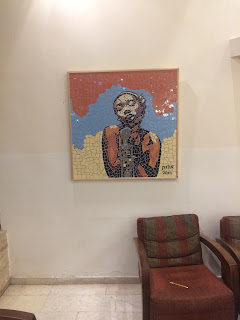On Wednsday we were given the opportunity to meet with three different rabbis at HUC and gain insight on their beliefs and values within reform, conservative and modern Orthodox Judaism. The first speaker Rabbi Loren Sykes (The upcoming NFTY EIE principal ) talked about conservative Judaism. He focused on theory vs. practice and explained to us his general views about the Torah. he believes that how one interprets the Torah and whether or not it is a human based document or if it is a Devine book from God. rabbi Loren Sykes also touched upon social justice laws and how those commandments such as giving tzedaka are obligatory in conservative Judaism.
Our second speaker who is a representative of HUC, was reform Rabbi Haim Shalon. Haim believes that Jewish law as a concept is not central to what it means to be Jewish. He also explained that the nature of humanity is progression therefor he belongs to Reform Judaism because as people grow and mature so does Reform Judaism and it's "rules or ways to live by" are not set in stone. He made an analogy saying that Judaism is like a game of chess and Reform Judaism is Chess with the exception of creating new rules. Haim told us that he personally does not believe that Jewish people are the chosen ones and that we in fact are just another realign like Christianity or Islam. He talked about secular vs religious Judaism and that he feels like prayer is not necessarily central to Judaism.
Our last speaker and former Jewish History teacher of EIE was Modern Orthodox rabbi Gabe Reiss. Gabe is religious Zionist and was very honest about his viewpoints. He has the same view of oral Law as the ultra orthodox do. He explained to us that the torah is the fundamental basis of Judaism and that God ultimately wrote it for our people because he needed to convey his message. He honestly told us that although he believes Reform Jews are legitimate Jews, the way we practice and continue to evolve and interpret the religion is not correctly representing what it means to be Jewish. He said that it order to truly be Jewish we have to live Torah in all levels of our lives.
Rabbi Haim Shalon also shared with us some information about the HUC campus. Because it was created in 1967, the Jordainian border ran right through the colleges property. The URJ purchased this land because it was cheap and although it was not than considered to be safe, today in Jerusalem HUC is now in a prime realastate location.
All three speakers brought up very interesting points about Judaism. Do you agree or disagree with what Rabbi Gabe Reiss said about Reform Judaism not practicing properly in a sense that Reform Judaism evolves with people and time , where as Orthodox Judaism is set and stone and along side of the Torah and not allowing change or evolution.
Our second speaker who is a representative of HUC, was reform Rabbi Haim Shalon. Haim believes that Jewish law as a concept is not central to what it means to be Jewish. He also explained that the nature of humanity is progression therefor he belongs to Reform Judaism because as people grow and mature so does Reform Judaism and it's "rules or ways to live by" are not set in stone. He made an analogy saying that Judaism is like a game of chess and Reform Judaism is Chess with the exception of creating new rules. Haim told us that he personally does not believe that Jewish people are the chosen ones and that we in fact are just another realign like Christianity or Islam. He talked about secular vs religious Judaism and that he feels like prayer is not necessarily central to Judaism.
Our last speaker and former Jewish History teacher of EIE was Modern Orthodox rabbi Gabe Reiss. Gabe is religious Zionist and was very honest about his viewpoints. He has the same view of oral Law as the ultra orthodox do. He explained to us that the torah is the fundamental basis of Judaism and that God ultimately wrote it for our people because he needed to convey his message. He honestly told us that although he believes Reform Jews are legitimate Jews, the way we practice and continue to evolve and interpret the religion is not correctly representing what it means to be Jewish. He said that it order to truly be Jewish we have to live Torah in all levels of our lives.
Rabbi Haim Shalon also shared with us some information about the HUC campus. Because it was created in 1967, the Jordainian border ran right through the colleges property. The URJ purchased this land because it was cheap and although it was not than considered to be safe, today in Jerusalem HUC is now in a prime realastate location.
All three speakers brought up very interesting points about Judaism. Do you agree or disagree with what Rabbi Gabe Reiss said about Reform Judaism not practicing properly in a sense that Reform Judaism evolves with people and time , where as Orthodox Judaism is set and stone and along side of the Torah and not allowing change or evolution.




























